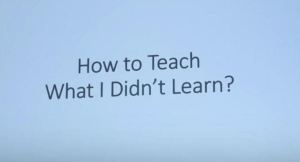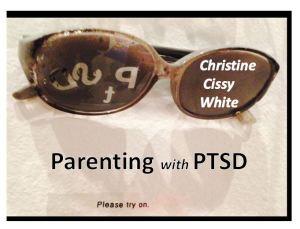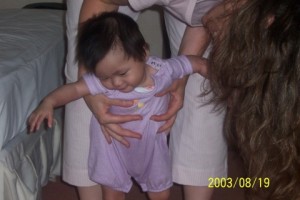 When my daughter was younger I was anxious. I didn’t have full-blown anxiety attacks, as some do. I had an almost constant anxiety motoring within me that would ebb and flow.
When my daughter was younger I was anxious. I didn’t have full-blown anxiety attacks, as some do. I had an almost constant anxiety motoring within me that would ebb and flow.
Sometimes, it lasted days. Other times, weeks. It always returned. When it did, it was hard to read, concentrate or focus. It was hard to eat or sleep or work.
It was hard to parent.
Sometimes it came with dread because I’d feel dreadful about being so anxious.
How I felt in my body scared me. I wanted to be someone else. Someone who felt different.
Anxious time moved slowly. An hour felt like a month and a day felt like a year. Watching the clock, I’d try to will it to pass. It was the opposite of being present. I was trying to be absent. Absent of anxiety that was consuming. Anxiety felt like a way of being, not a feeling or symptom.
Getting through the day was my biggest goal, the high bar I hoped to reach. At those times it took all I had to rise to that challenge. To do that, while not falling flat on my face, as well as in my role as a mother, felt nearly impossible.
Bad. All of it felt bad. But being unable to enjoy or attend to my daughter the way she deserved was the worst part.
She was too young to complain. But she felt it.
I knew that. I always knew that.
She would get clingy. She would move in closer as though she could keep the balloon of me from floating out of her reach. Did I feel like an out-of-reach object of security, like a binky dropped from a high chair or a blanket from the bed? It must have scared her to see the shaky shadow version of me. It was scary to me.
It was as if I was disappearing and being crowded out by anxiety that was sucking up all of the space and air. It felt as if my anxiety was contagious, as if I was a flu that shouldn’t be nearby anyone or anything. Just being me, while anxious, felt like awful, terrible, no-good mothering.
There was no denying she noticed either. As she aged, she’d say, “I feel like we were together but not together” or “I need more Mama time.”

Part of me was proud of her ability to know and express her feelings and needs.
Part of me was frustrated. Her words felt like an insult, a demand and an accusation.
“I’m doing the best I can,” I wanted to scream.
“Do you know how much worse I had it at your age?” I’d think.
Self-hatred, guilt, and shame piled one upon another like pasta, cheese and sauce in a baking pan. They blended, baked and melted in the oven of me, only the dish cooked up was barely edible.
I was lucky to have a good friend who became my mentor mom. She was a role model, a confidante and someone whose advice I was willing to listen to and take. She had something I wanted: grown children who were happy, healthy and who still spoke to her.
When my daughter napped or watched a movie, I often sneaked into the bathroom and whispered into the phone to confess how hard mothering was for me.
Admitting I felt anxious and scared was sometimes all I needed to feel a little bit better and more safe. It could help me to stop holding my breath, might cause me to cry and release stress.
My friend was always gentle and warm and kind.
She was like sunlight, water and air coming in when I felt trapped in myself.
My friend loved and accepted me, all of me, and seemed able to tolerate the anxious part of me that I still hated. She would remind me that parents without a history of childhood trauma have had days when they check out and aren’t present.
That would help me so much.
She would tell me she was proud of me for working so hard at mothering.
She’d say that even “good parents” sometimes put their kids in front of a TV, a computer, a craft or technology and some didn’t even feel all that badly about doing so.
“Are you serious?” I’d ask.
She said some parents didn’t cook from scratch and were sort of distracted at times, too, not because of anxiety attacks or nightmares or crisis, but because of health, job changes or other issues.
“Really?” I’d ask, in a whisper, “You’re not just trying to make me feel better?”
“Really. Really. Really,” she would say.
It felt as if she was giving me illegal, insider information.
And when I felt super afraid, she’d encourage me to reach out for help or support. She’d tell me shame and beating up on myself didn’t help me or my daughter.
That would help as well. And sometimes it would be enough to anchor me and help me return to myself.
“You are a good mom” she would say.
“I’m not,” I’d argue, “I’m not.”
“You’re a good enough mom,” she’d insist, and though I didn’t believe her words, the fact that she said them gave me strength.
She didn’t shame me for not knowing stuff I didn’t know. She didn’t judge me for feeling shaky and scared about my skills and abilities.
She let me admit the truth of my actual experience of mothering and that, alone, would help me mother better.
And she let me check myself as well so I could get a sense of what was trauma-related stuff and what was stuff all parents struggled with. I had no way to know the difference.
It was so hard to manage my own feelings and symptoms and to attend to those of my daughter. I was so afraid of all I didn’t know coupled with all I had lived through at her age. With my friend I could question the way I had been parenting without sounding critical, being defensive or getting into an argument with anyone. With my friend, I could learn new ways of parenting.
And sometimes, just talking was enough.
I could and would return to my daughter more whole, and more relaxed. I’d be more available, either with less anxiety or at least anxious without self-doubt and self-hate.ithout as much anxiety and self-doubt.
I might sit and watch Sesame Street with my baby girl, holding her and letting the show nurture me as well by trying to take in all the calming, warm and silly sketches. If I was too agitated for that, I might get us in the car and attend to some errands so when I did feel more present I wouldn’t be so busy with chores.
If I was too agitated for that, I might get us in the car and attend to some errands so when I did feel more present I wouldn’t be so busy with chores.
I found ways to manage, and my mentor mom’s support helped.
Parenting with ACEs doesn’t always require intense therapy. Sometimes all we need is a conversation, friends, and reminders that we will be o.k., if not immediately, then eventually.
Those things help us as parents.
Helping parents improves parenting.
For more information about ACEs — adverse childhood experiences — go to ACEs Science 101. Got Your ACE Score (and resilience score)?
I love this! So honest and well written. I can feel myself in it. Along the same lines, I’ve been wondering something lately. Where is the line between my ongoing reactions to ACEs and beginning to traumatize my own children who have to watch their mother struggle. I wonder at what point these feelings and lenses I see the world through solidified for me and I wonder if my daughters watching my anxiety and anger is leading them to that very moment themselves. It’s something I think about every night but it’s difficult to pull up in the moment when I am overreacting to normal toddler destruction and chaos. Always something to work on. Thank you for sharing your experience.
LikeLike
That was powerful. Thank you for sharing your experience. I have felt similarly. After having my son, a little over a year ago, it was as though all of my anxieties flooded to the surface, and when I did try facing them, panic attacks ensued. It has been a journey, but you’re right, consistent relationships with dependable friends who can speak a word of encouragement are a must. Blessings!
LikeLike
[…] Anxious parenting: Parenting with ACEs was originally published @ ACEs Too High and has been syndicated with permission. […]
LikeLike
My gosh, Crissy… this is so powerful, and there is so much here to help other parents parenting with untreated ACEs. Your description of anxiety really resonated, “Anxious time moved slowly. An hour felt like a month and a day felt like a year. Watching the clock, I’d try to will it to pass. It was the opposite of being present. I was trying to be absent. Absent of anxiety that was consuming. Anxiety felt like a way of being, not a feeling or symptom.” Thank you so much for sharing.
LikeLike
Lisa:
Thank you. We don’t even know what we don’t know – until we know. So often we’re flailing, not knowing why it’s so hard while trying hard. Grateful for more language, understanding, and perspective. And mostly, for more time to make it up to my kid and help her learn better ways for if she becomes a mother. Cis
LikeLiked by 1 person
Thank you….again Cissy. Your words lend such clarity to those of us living and working with Children with trauma histories.
LikeLiked by 1 person
Melissa:
That’s so good to hear. Thank you for reading, commenting and more, for the great work you do! Cissy
LikeLike
Thanks for sharing this. It’s good to know that some women with ACEs DO figure out how to parent. I never did. I got stuck in severe depression and suicide attempts because I had no idea how to care for my daughter and I was terrified of harming her. I thought she’d be better off without me. I ended up leaving. She’s 20 now and doing fine. But I never figured out how to mother her.
LikeLiked by 1 person
Lisa:
What an honest comment. I’m sorry for your anguish and confusion and pain. Parenting with ACEs can be so hard for parents and for our kids. I’m glad you survived and that your daughter is doing fine. I honestly believe it’s never too late to learn to mother and that we often have to start with mothering ourselves. The best resource I found for that isn’t a parenting book at all. maybe that’s why it helped me. It’s by Cheri Huber and it’s called “There’s Nothing Wrong with You No Matter What you Think” and it’s all about ending self-hate. It’s one of my go to books when symptoms flare. Anyhow, thank you for commenting so honestly. Cissy
LikeLiked by 1 person